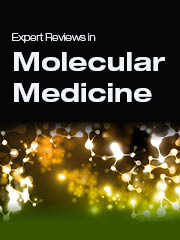Crossref Citations
This article has been cited by the following publications. This list is generated based on data provided by
Crossref.
Barreca, Maria Letizia
Ortuso, Francesco
Iraci, Nunzio
De Luca, Laura
Alcaro, Stefano
and
Chimirri, Alba
2007.
Tn5 transposase as a useful platform to simulate HIV-1 integrase inhibitor binding mode.
Biochemical and Biophysical Research Communications,
Vol. 363,
Issue. 3,
p.
554.
Engelman, Alan
2007.
Host Cell Factors and HIV-1 Integration.
Future HIV Therapy,
Vol. 1,
Issue. 4,
p.
415.
Boberg, Andreas
and
Isaguliants, Maria
2008.
Vaccination against drug resistance in HIV infection.
Expert Review of Vaccines,
Vol. 7,
Issue. 1,
p.
131.
Shimura, Kazuya
and
Kodama, Eiichi
2008.
Elvitegravir: An Emerging HIV Integrase Inhibitor.
Future HIV Therapy,
Vol. 2,
Issue. 5,
p.
411.
Herschhorn, Alon
Oz-Gleenberg, Iris
and
Hizi, Amnon
2008.
Quantitative analysis of the interactions between HIV-1 integrase and retroviral reverse transcriptases.
Biochemical Journal,
Vol. 412,
Issue. 1,
p.
163.
Hizi, Amnon
and
Herschhorn, Alon
2008.
Retroviral reverse transcriptases (other than those of HIV-1 and murine leukemia virus): A comparison of their molecular and biochemical properties.
Virus Research,
Vol. 134,
Issue. 1-2,
p.
203.
Adamson, Catherine S.
and
Freed, Eric O.
2008.
Recent progress in antiretrovirals – lessons from resistance.
Drug Discovery Today,
Vol. 13,
Issue. 9-10,
p.
424.
Mirambeau, Gilles
2008.
Cómo se integra el ADN proviral en el ADN de la célula del huésped y cómo se puede inhibir el proceso.
Enfermedades Infecciosas y Microbiología Clínica,
Vol. 26,
Issue. ,
p.
11.
Avidan, Orna
and
Hizi, Amnon
2008.
Expression and characterization of the integrase of bovine immunodeficiency virus.
Virology,
Vol. 371,
Issue. 2,
p.
309.
Staunstrup, Nicklas H
Moldt, Brian
Mátés, Lajos
Villesen, Palle
Jakobsen, Maria
Ivics, Zoltán
Izsvák, Zsuzsanna
and
Mikkelsen, Jacob Giehm
2009.
Hybrid Lentivirus-transposon Vectors With a Random Integration Profile in Human Cells.
Molecular Therapy,
Vol. 17,
Issue. 7,
p.
1205.
Dar, Mohd J
Monel, Blandine
Krishnan, Lavanya
Shun, Ming-Chieh
Di Nunzio, Francesca
Helland, Dag E
and
Engelman, Alan
2009.
Biochemical and virological analysis of the 18-residue C-terminal tail of HIV-1 integrase.
Retrovirology,
Vol. 6,
Issue. 1,
Warren, Kylie
Warrilow, David
Meredith, Luke
and
Harrich, David
2009.
Reverse Transcriptase and Cellular Factors: Regulators of HIV-1 Reverse Transcription.
Viruses,
Vol. 1,
Issue. 3,
p.
873.
Briones, Marisa S.
and
Chow, Samson A.
2010.
A new functional role of HIV-1 integrase during uncoating of the viral core.
Immunologic Research,
Vol. 48,
Issue. 1-3,
p.
14.
Yao, Xue
Fang, Shasha
Qiao, Wentao
Geng, Yunqi
and
Shen, Yuequan
2010.
Crystal structures of catalytic core domain of BIV integrase: implications for the interaction between integrase and target DNA.
Protein & Cell,
Vol. 1,
Issue. 4,
p.
363.
Wielens, Jerome
Headey, Stephen J.
Jeevarajah, Dharshini
Rhodes, David I.
Deadman, John
Chalmers, David K.
Scanlon, Martin J.
and
Parker, Michael W.
2010.
Crystal structure of the HIV‐1 integrase core domain in complex with sucrose reveals details of an allosteric inhibitory binding site.
FEBS Letters,
Vol. 584,
Issue. 8,
p.
1455.
Ramkumar, Kavya
Yarovenko, Vladimir N.
Nikitina, Alexandra S.
Zavarzin, Igor V.
Krayushkin, Mikhail M.
Kovalenko, Leonid V.
Esqueda, Adrian
Odde, Srinivas
and
Neamati, Nouri
2010.
Design, Synthesis and Structure-activity Studies of Rhodanine Derivatives as HIV-1 Integrase Inhibitors.
Molecules,
Vol. 15,
Issue. 6,
p.
3958.
Adamson, Catherine S.
and
Freed, Eric O.
2010.
Novel approaches to inhibiting HIV-1 replication.
Antiviral Research,
Vol. 85,
Issue. 1,
p.
119.
Le, Giang
Vandegraaff, Nick
Rhodes, David I.
Jones, Eric D.
Coates, Jonathan A.V.
Thienthong, Neeranat
Winfield, Lisa J.
Lu, Long
Li, Xinming
Yu, Changjiang
Feng, Xiao
and
Deadman, John J.
2010.
Design of a series of bicyclic HIV-1 integrase inhibitors. Part 2: Azoles: Effective metal chelators.
Bioorganic & Medicinal Chemistry Letters,
Vol. 20,
Issue. 19,
p.
5909.
Le, Giang
Vandegraaff, Nick
Rhodes, David I.
Jones, Eric D.
Coates, Jonathan A.V.
Lu, Long
Li, Xinming
Yu, Changjiang
Feng, Xiao
and
Deadman, John J.
2010.
Discovery of potent HIV integrase inhibitors active against raltegravir resistant viruses.
Bioorganic & Medicinal Chemistry Letters,
Vol. 20,
Issue. 17,
p.
5013.
Desfarges, Sébastien
and
Ciuffi, Angela
2010.
Retroviral Integration Site Selection.
Viruses,
Vol. 2,
Issue. 1,
p.
111.


